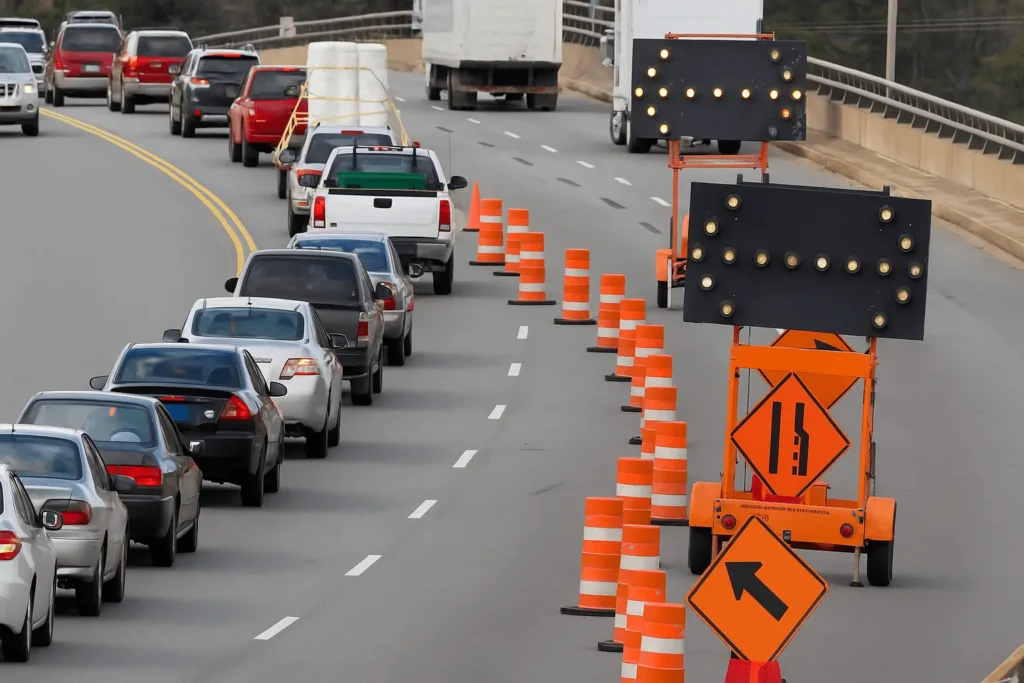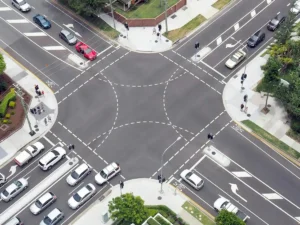How often have you been caught in a traffic snarl caused by unplanned roadworks or confusing detours? The need for professional traffic management Sydney offers becomes clear in those moments. Going beyond simply directing cars, this vital service protects, ensures faster approvals, and reduces congestion through planned strategies. The end result helps to gain support and strengthen the community’s confidence.
Let’s understand the broader impacts, straight from the leading consultant of traffic management Sydney has trusted for 20+ years.
1. Organised Safety and Convenience
What is the true cost of a preventable incident? Beyond human harm, an incident can interrupt work, trigger fines, and damage reputations. Here, a professional traffic management team in Sydney can implement multiple measures.
They include:
- Accredited controllers to oversee high-risk zones
- Truck-mounted attenuators (TMAs) to shield crews from collisions
- Clear detour signage for pedestrians and vehicles
- Speed management measures compliant with TfNSW guidelines
Did you know? In Sydney, every traffic management plan must comply with council, police, and TfNSW (Transport for NSW) requirements. Here, a traffic management team trained to meet TfNSW standards is often the basic requirement to meet the standards.
2. Streamlined Approvals and Compliance Make it Convenient for All the Stakeholders
Projects stalled due to delayed permits? When it comes to commercial partners and government bodies, expectations are high. In Sydney, traffic control plans must satisfy local councils, police, and Transport for NSW.
For example, lane closures in the Sydney CBD require strict adherence to night-time scheduling, while works in residential suburbs like Castle Hill or Ryde often demand noise management measures.
The role of a professional team here is efficient traffic management that Sydney firms demand. For clients, this approach means:
- Faster permit approvals
- Fewer costly revisions
- Greater confidence that deadlines will be met
3. Minimising Congestion in Challenging Precincts
Minimising congestion is indeed the primary goal of traffic management in Sydney. But when reports talk about Sydney losing billions each year, the alarming numbers might rise if practical steps are missed.
However, the real challenge lies in the diverse precincts and poorly managed traffic arrangements at such locations. Here, smoother flow and promptly resolved bottlenecks can be achieved by:
- Designing staged works for an uninterrupted flow
- Coordinating lane closures to work around peak traffic
- Using portable Variable Message Signs (VMS) to guide drivers in advance
In corridors like Parramatta Road, the M4, and local CBD precincts where delays have wide-ranging economic effects, professional traffic management firms play an irreplaceable role.
4. Financial Efficiency with Project Certainty
According to NSW transport authorities, traffic congestion costs millions, lost productivity, and contributes to pollution as well. The travel times have increased by more than 20% compared to last year, with congestion now extending beyond the Central Business District.
Without a co-ordinated approach of traffic control experts, it can lead to unexpected penalties. By integrating planning, accredited staff, fleet, and permit handling, dependency on multiple subcontractors and the complexities are reduced.
It also reduces financial risks while keeping projects efficient for businesses. How? Because it aims to protect not just pedestrians and drivers navigating your specified work zones, but workers too. Many such factors combine for an effective traffic management that Sydney residents deserve.
5. Community-Centric Approach and Trust Building
How will local communities respond to our project if their daily lives might be disrupted?
This is the question that rightly concerns NSW government bodies, commercial partners, and private contractors. Here, only an experienced traffic management company in Sydney can understand the ramifications of being negligent.
Our decades of experience can affirm that poor communication, or unplanned closures can spark widespread frustration and complaints. To avoid, a professional traffic management firm like ours considers:
- Transparent and early communication with impacted residents
- Visible and advance signage in multiple languages wherever relevant
- 24×7 emergency response
Measures like these not only build trust or reduce complaints, they also ensure that your projects are seen as considerate, not disruptive. They help in building a positive presence and trust amongst the local residents. To achieve it, leadership at AAA Traffic Control proudly promotes its proactive consideration during the planning stage itself.
What Can Be Done to Ease Sydney’s Traffic Woes?
With Western Sydney Airport, Parramatta Light Rail, and ongoing growth in suburbs, Sydney’s road network faces new pressures. So, while expectations from authorities and communities are increasing, a professional traffic management system in Sydney can ensure safety and efficiency.
Let’s see a few suburb-specific challenges and suggested solutions from experts at AAA Traffic Control from the table below:
| Suburb Zone | Common Issues | Suggested Measures |
| Western Sydney (Blacktown, Penrith, Rooty Hill) | High-speed roads, major freight traffic | TMAs, accredited controllers, staged closures |
| Inner West (Marrickville, Ashfield, Newtown) | Narrow roads, heavy pedestrian activity | Night-time works, clear pedestrian detours |
| CBD & Harbour (Barangaroo, Circular Quay, Pyrmont) | Congestion, strict council conditions | Advanced TGS, portable VMS, and off-peak scheduling |
| Northern Beaches (Dee Why, Mona Vale, Brookvale) | Limited routes and high seasonal traffic | Staggered closures and event-specific traffic planning |
| Eastern Suburbs (Bondi, Randwick, Maroubra) | Tourism surges, coastal events | Dynamic signage and effective crowd management |
| Outer Suburbs (Camden, Windsor, Richmond) | Rural access, emergency service priority | Flexible detours and coordination |
AAA’s Traffic Control expertise minimises disruption through reliable services, particularly in peak commuter zones across many such suburbs.
Professional Traffic Management is Essential in Sydney
Sydney experiences some of the highest volumes of road traffic. To address it, our traffic management Sydney-centric experts offer you meticulous planning, comprehensive risk assessment, and deployment of experienced personnel.
What we bring to every project:
✅Over 20 years of experience across Sydney’s varied landscapes
✅More than 12,000 successful assignments in urban, suburban, and rural settings
✅ISO-certified systems for quality, safety, and environmental management
✅A modern fleet of TMAs, cone trucks, and VMS boards
✅200+ accredited staff trained to TfNSW G10 standards
✅24×7 emergency response for both planned and unexpected
Our team understands the challenges and offers a level of professionalism that minimises road accidents, reduces congestion, and protects precious lives.
Learn more about our traffic control capabilities and contact us at (02) 9675 7731. With our traffic management expertise, we aim to support your project revolving around Sydney’s arteries.
FAQs
Q. Why choose a professional traffic management Sydney-serving firm over basic traffic control?
Because it blends compliance, safety, and congestion relief, ensuring projects in Sydney progress without costly setbacks or community backlash.
Q. Can a Sydney-centric traffic management company lower your project costs?
Yes, by integrating planning, staffing, and equipment, it prevents delays, fines, and duplication of subcontractor costs.
Q. How does a professional traffic management firm in Sydney adapt to weather extremes?
Plans include contingencies for heat, heavy rain, and bushfire risks, common challenges across Sydney’s climate zones.
Q. How does traffic management strengthen community relations?
By giving residents clear notice, minimising noise, and ensuring 24/7 access for emergencies, it builds trust instead of frustration.
Q. What role does technology play in traffic management?
Smart VMS boards, GPS fleet tracking, and data-led scheduling improve response times and reduce congestion.






